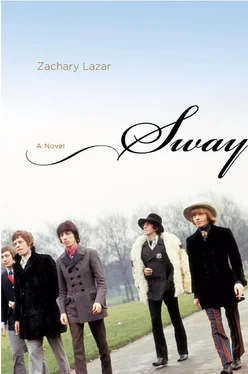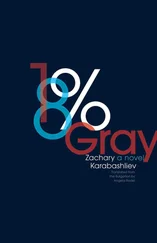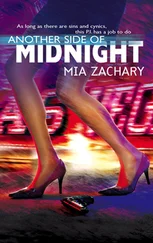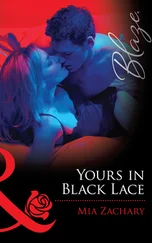The T-shirt was ripped and covered with brownish stains, obviously bloodstains. It was silk-screened with a picture of a BSA motorcycle. Anger guessed right away who it was from, because a month ago Bruce Byron had sent a telegram, the latest in a series, congratulating him on the success of Scorpio Rising , its interesting ideas, and leaving the implication that he was somehow owed money.
Bobby was gone for six days when there was a phone call. Less than an hour later, he showed up in front of the crumbling Victorian house with his guitar wrapped in an army blanket against the rain. His hair was wet and his white buccaneer’s shirt hung from his body like a soaked, transparent rag. Someone had stolen his money, or he had lost his money — it would never be clear when Bobby talked about money. From what he’d told Anger on the phone, he had slept the night before in an abandoned car.
The two of them stood in the front hall, Bobby in a puddle of water that was absolutely clear, like new varnish on the pine floor.
“He just turned on me,” he said. “That’s how it is with people like that.”
“Who?” said Anger.
“I don’t know. This spade cat, Donald, it’s not important.”
Anger bowed his head as Bobby came farther inside, hugging his guitar to his chest.
“I’ll have to go back later,” he said. “I just need to cool out for a while. They have my clothes, everything.”
They went past the kitchen and into the apartment’s extra bedroom. It was an old ballroom with molded ceilings and high windows that looked out on the sycamores below. It was cluttered with boxes. Bobby peeled off his shirt, dropping it on the floor, his back to Anger. He roughed up his hair with his fingers. He bent over and let its ends fall to his knees, then stood up straight and flipped his head up so that the wet black strands shot back over his shoulders.
“I appreciate this,” he said, looking into Anger’s eyes.
“Don’t be ridiculous.”
“No, really. I appreciate it.”
His face was younger and plainer without all of his hair falling over his forehead. Bare-chested, his white skin taut with goose pimples, he looked like a high school boy damp from the shower after gym.
Anger moved some of his boxes and trunks into the closet and stacked some others against the two far walls. He plugged a desk lamp into the socket by the window, trying not to look at him.
An hour later, they were in Anger’s room — the only room in the apartment resembling a common room — where they sat on the couch and shared a joint. Through the leaded windows, the leaves on the trees were a shiny green, sagging from their branches. The rain had stopped, but the sky was still gray, making every color stand out like something permanent.
“You’re not telling me what really happened,” said Anger.
Bobby shook his head in a bored way, his eyes closed. Anger watched the smoke come out of his nostrils.
“Some things went wrong,” he finally said. “On the way to L.A., it didn’t happen the way I thought it would. There are people — some people don’t care about themselves. So then they can’t care about anything. That’s the way it happens sometimes.”
“You never made it to L.A.”
Bobby wiped the corners of his eyes with his thumb and forefinger. “That’s all I can say,” he said. “I’ll leave, if you want me to leave.”
There was a newspaper on the floor. It brought word of Vietnam — Saigon, Haiphong, Da Nang — the names by now somehow remote without being exotic. Anger looked at the words without quite seeing them, and for some reason he thought of Bobby’s band, the tuneless, naively serious band that he thought was going to make him a star. He thought of the foolish scheme — a drug deal, he supposed — that had failed to facilitate that plan.
He brought his fingers to Bobby’s still-damp hair. He had touched him like this before, while filming, but there was no camera now, and Bobby went still, calibrating his response. He didn’t stand up or push Anger away, but only sat there with an abstracted expression in his eyes, as if this were happening to someone else.
“You’re having a strange day,” said Anger.
“Everything is strange.”
“No, not everything is strange. Some things are ordinary.”
When he reached for Bobby’s thigh, Bobby didn’t move, he just looked down at the hand, his lips parted slightly. Anger loomed over him for a moment, watching, then he shifted himself onto the floor. Bobby’s eyes were fixed on his now, his forgotten joint still burning between his thumb and forefinger. Then he looked down at Anger’s hand, his Adam’s apple shifting drily in his throat.
Bobby’s damp skin smelled faintly, oddly, like kerosene. Anger pressed his thumbs to where his abdomen met his hips, feeling it expand and contract with his breaths. He had unzipped Bobby’s pants, but it was Bobby, not Anger, who had pushed them farther down over his knees. After he came, he kept his eyes closed, breathing heavily through his nostrils. His face was peaceful then, as if in sleep, except at the corner of his mouth, where there was the faintest shadow of a grimace.
“I just think you should know,” Bobby said. “I’m not like that.”
“You’re not like that.”
“You know. . I’m not that way. I don’t mind it sometimes, if it’s there. I’m not uptight. But it’s no big deal either way.”
Bobby moved into the extra bedroom that week. Anger bought him a mattress and a blanket and some pillows, and he stacked the rest of the boxes as well as he could in the closet. He bought Bobby groceries: white bread, potato chips, beer. It happened gradually, without much discussion. The mention of all these practicalities was not something either of them believed in.
Late at night, through the half-opened door, he would sometimes see Bobby on the floor of his new room, smoking pot with his friends, listening to music or playing music on their guitars. They would lean their heads back toward the ceiling in neutral contemplation, as if the world had just been created for their benign explorations. There would be girlfriends, an endless succession, in jeans or flowered skirts, long hair falling into their eyes. One or two of them would always end up in Bobby’s bed by the end of the night, lying beside him in the dim light of a few candles, Bobby with one of Anger’s effects in his hands — a toy motorcycle, a deck of tarot cards — anything he could absently study while the girls waited and watched.
Anger never felt that he was being taken advantage of. He saw their arrangement through Bobby’s eyes: the sense of justice that would come from having his own room in the apartment, a private place to take his girlfriends, a sink in which to leave his dirty dishes. When Anger had his own guests over — filmmakers, artists, theater people — there was a cachet in having so many young people around. It made him feel like Bobby’s accomplice, younger than he really was, young enough to be Bobby himself.
He had only the vaguest idea of what the film they were making was actually going to consist of. So far, he was just filming Bobby’s life: playing his guitar, smoking a joint, standing in front of the house where they had painted the door purple and scrawled the words THY WILL BE DONE! What happened between them, when the day’s filming was over and there were no more guests around, was a secret that Bobby seemed to keep even from himself. His ambivalence — his obstinate, closed eyes — never resolved into a refusal or an invitation. He had threatened to kill Anger if he ever told anyone.
If you took away the nails and the cross, then the god would be only a naked boy, extending his arms in calm recognition. Removed from his post, he would be free to go where you’d always wanted to follow, stepping down into that fiery zone where there was no meaning for words like “self” and “other,” “reality” and “dream,” “desire” and “fear.” Lucifer, the morning star. His paleness would cast a green reflection in the night sky. In the secret darkness, he would be as glad as you were to see that the stupid pretense of his chastity had finally come to an end. But he could be as distant and elusive as any other god. Like his counterpart, the god on the cross, he came to bring not peace but a sword.
Читать дальше












